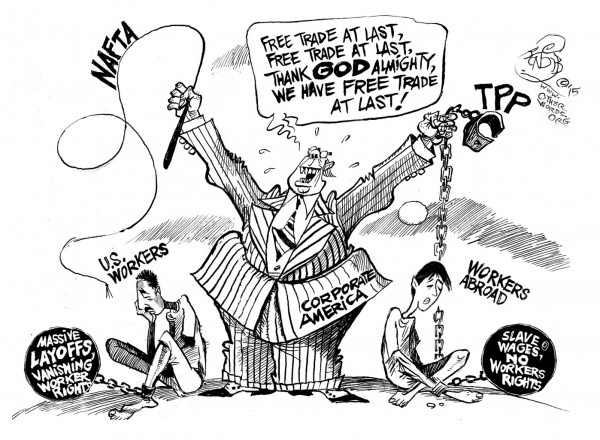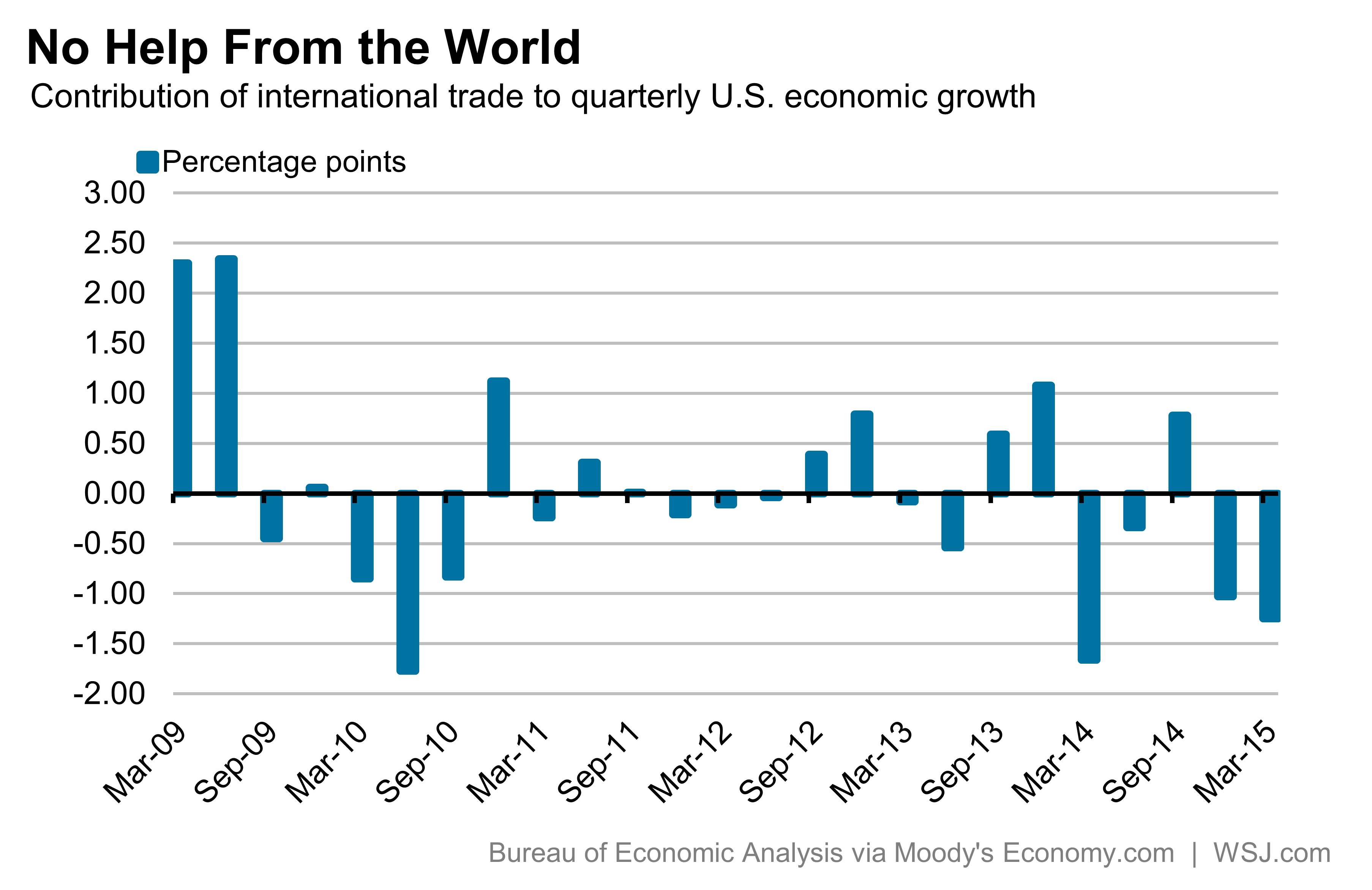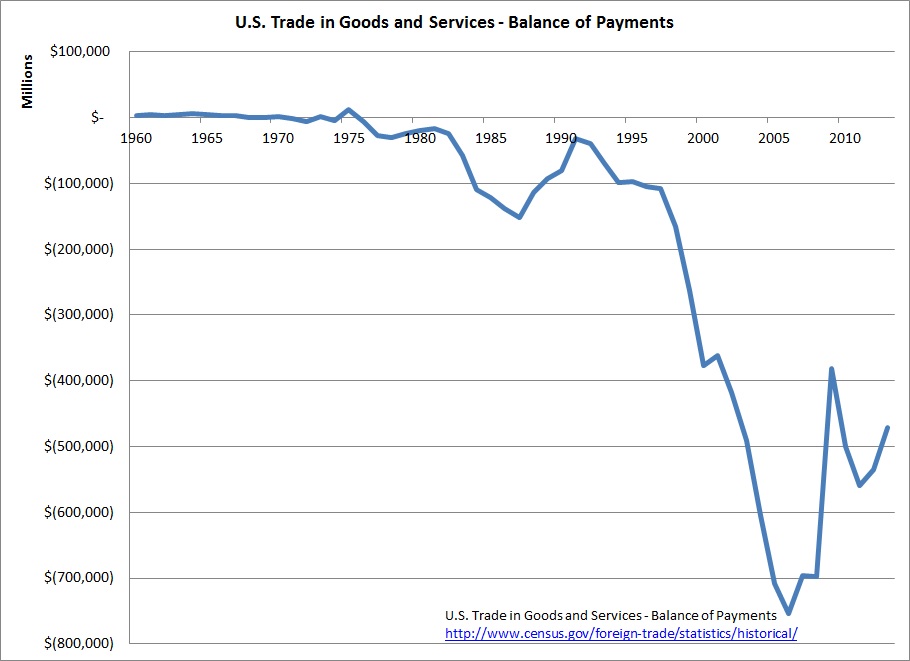If you make things and sell them, you do better over time than if you borrow to buy things. If you send jobs and factories out of the country, you end up with devastated cities like Baltimore.
 Sure, a few people get rich from that, but 99 percent of us get poorer. How hard is it to see that?
Sure, a few people get rich from that, but 99 percent of us get poorer. How hard is it to see that?
You may have heard that gross domestic product growth was dismal in the last quarter. You may have heard that there were riots in Baltimore. You may not have heard that these are both at least partly caused by our enormous, humongous and continuing trade deficit.
Trade Deficit
A trade deficit is when we import more than we export. It means that there is a certain level of demand in our economy, but some of that demand is leaking out to other countries. When this deficit is significant and goes on for a while it means that jobs are lost, factories close and we get poorer.
We started having trade deficits in the late 1970s with the ascension of free-market, free-trade ideology. We have continued to have trade deficits every single year since, and they have grown into the hundreds of billions. So…millions of jobs, tens of thousands of factories, trillions of wealth…gone.
You can see the result in Detroit, Cleveland, the “Rust Belt,” towns full of boarded-up houses and empty storefronts – and the economic devastation and desperation that leads to what we see playing out this week with riots in Baltimore.
Here is a chart of our trade deficit over time:
0.2 Percent Growth Partly Due To Trade Deficit
The Bureau of Economic Analysis reported Wednesday that “real gross domestic product – the value of the production of goods and services in the United States, adjusted for price changes – increased at an annual rate of 0.2 percent in the first quarter of 2015.”
The reasons? “The increase in real GDP in the first quarter primarily reflected positive contributions from personal consumption expenditures (PCE) and private inventory investment that were partly offset by negative contributions from exports, nonresidential fixed investment, and state and local government spending. Imports, which are a subtraction in the calculation of GDP, increased.” (Emphasis ours.)
Also, “Real exports of goods and services decreased 7.2 percent in the first quarter, in contrast to an increase of 4.5 percent in the fourth. Real imports of goods and services increased 1.8 percent, compared with an increase of 10.4 percent.”
Dragging Us Down
The Wall Street Journal explains how much the trade deficit is dragging us down, in “Trade Woes Bedevil Obama, Fed.” President Obama, they write, “is trying to sell a trade deal just as trade is dragging the U.S. economy down.” This is because, “Net trade subtracted a whopping 1.25 percentage points from first-quarter growth.” Also, “Indeed, trade has been a drag on growth in four of the past five quarters. It subtracted 0.22 percentage points from growth in 2014 as a whole.”
Take a look at this chart from the WSJ story:
 The trade deficit keeps dragging us down, down, down, year after year, so that a few already-wealthy plutocrats can pocket the difference between what we pay in the U.S. and the pittance they pay exploited workers and pay to protect the environment “over there.”
The trade deficit keeps dragging us down, down, down, year after year, so that a few already-wealthy plutocrats can pocket the difference between what we pay in the U.S. and the pittance they pay exploited workers and pay to protect the environment “over there.”
Not An Accident – It’s Policy
An important analysis of our situation appeared this week. Robert Reich wrote about how our system is rigged against us, lowering wages and causing terrible insecurity. Underneath that insecurity is the widespread fear many of us have that we could end up facing the hopelessness of the people trapped in places like Baltimore and Detroit (and city after city after city devastated by year after year after year of decline as we ship our jobs and factories away…).
At The American Prospect, Reich writes, in “The Political Roots of Widening Inequality,” that “key to understanding the rise in inequality isn’t technology or globalization. It’s the power of the moneyed interests to shape the underlying rules of the market.”
He writes that so many of us feel job insecurity as a result of intentional rigging of the rules in favor of those at the top and against the rest of us:
For example, some of their economic insecurity has been the direct consequence of trade agreements that have encouraged American companies to outsource jobs abroad. Since all nations’ markets reflect political decisions about how they are organized, so-called “free trade” agreements entail complex negotiations about how different market systems are to be integrated. The most important aspects of such negotiations concern intellectual property, financial assets, and labor. The first two of these interests have gained stronger protection in such agreements, at the insistence of big U.S. corporations and Wall Street. The latter—the interests of average working Americans in protecting the value of their labor—have gained less protection, because the voices of working people have been muted.
Policy, Not Something That Just Happened
Dean Baker drove this point home this week in, “‘Globalization’ Was Policy, Not Something That Happened“:
The downward pressure on wages was the deliberate outcome of government policies designed to put U.S. manufacturing workers in direct competition with low-paid workers in the developing world. This was a conscious choice. Our trade deals could have been designed to put our doctors and lawyers in direct competition with much lower paid professionals in the developing world.
As I wrote above, it is not just our trade policies rigging the system against most of us. Government policies across the board have been dragging us down for decades. Tax cuts for the rich have resulted in cuts in the things government does to make our lives better. (Just this week, Kansas cut taxes for the rich, and now Kansas’ schools are out of money and closing.)
We are not investing in maintaining – never mind modernizing – our infrastructure. We keep cutting back on science and health research and education. These are basic investments in our economy but are derided as “government spending” as if the function of our government shouldn’t be to do things that make our lives – and economy – better.
Look at what is happening in Baltimore, where desperate people and hopelessness combine until a match is lit. We have to change this. We have to demand we balance our trade and invest in our people and economy again. We have to demand political leadership that responds to us, not just wealthy donors. This country is not intended to be a plutocracy of by and for the rich; it is intended to be a democracy of by and for We the People.
Editor’s Note: This essay originally appeared at Campaign for America’s Future (CAF) at their Blog for OurFuture. It also appeared on May 2, 2015 on Seeing the Forest, a website featuring commentary by Dave Johnson, frequent public speaker and talk-radio guest and a leading participant in the progressive blogging community. It was reproduced here with the consent of Mr. Johnson.
Image Credit:hereandnow.wbur.org



Leave a Reply